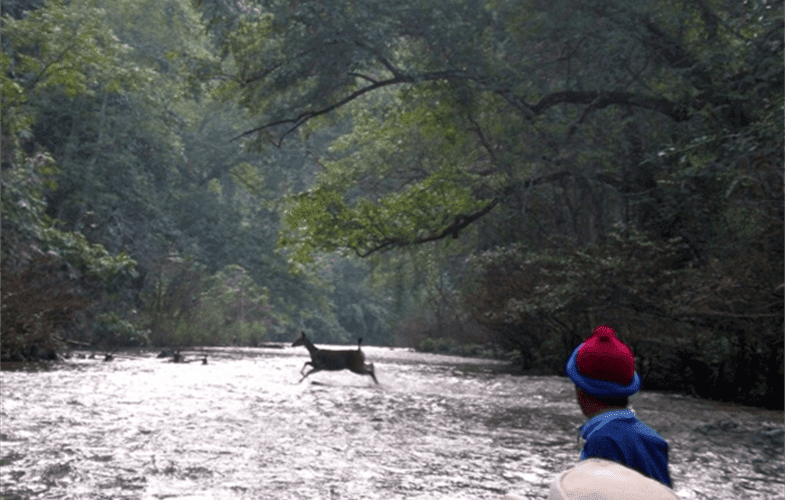
A new study by the Wildlife Conservation Society (WCS) and Foundations of Success (FOS) finds that an ecotourism strategy based on “direct payments,” where local people are compensated for the amount of wildlife seen by tourists, has resulted in a reduction in illegal hunting and an increase in wildlife sightings.
In the study, the scientists tested a new model in Lao People’s Democratic Republic (PDR)’s Nam-Et-Phou Louey (NEPL) National Protected Area (NPA) that used a direct payment approach to encourage villagers to reduce illegal hunting and trade, which is driving wildlife decline. The model included a contractual payment to villages that was directly tied to the numbers of wildlife seen by eco-tourists as well as a reduction in payments for occurrences of hunting violations. The approach was designed to reduce illegal hunting pressure, increase wildlife sightings, and ultimately wildlife numbers, while generating ongoing economic incentives for conservation.
The scientists implemented and then monitored this approach for four years. Results indicated a three-fold increase in hunting signs in the non-tourism sector of the NPA as opposed to no increase in the ecotourism sector. Additionally, an overall increase in wildlife sightings was observed. A wide range of threatened species benefited from the program, including Sambar deer, barking deer, primates and small carnivores.
“If eco-tourism or nature tourism is going to help increase these wildlife populations, there must be a direct link between the incentives for communities and the wildlife itself, “ said Bounpheng Phoomsavath, Director of Nam Et — Phou Louey National Protected Area. “Many projects claim to be benefiting wildlife but they often lack this direct link. Villagers get benefits but the wildlife populations continue to decline. The direct links are the key to our success.”
In cases where ecotourism is used as a biodiversity conservation strategy, projects are often questioned for lack of resulting proof that threats to biodiversity have been averted or conditions for biodiversity have been improved.
“This study illustrates the importance of monitoring along a theory of change to evaluate if and how a conservation strategy is leading to expected outcomes and to inform adaptive management,” said WCS Lao PDR Deputy Country Director Dr. Santi (Joy) Saypanya.
The scientists say the case “provides key lessons on the design of a direct payments approach for an ecotourism strategy, including how to combine threat monitoring and data on wildlife sightings to evaluate strategy effectiveness, on setting rates for wildlife sightings and village fees, and the utility of the approach for protecting very rare species.”
Learn more: A Bird in the Bush Equals Money in the Hand
The Latest on: Ecotourism strategy
[google_news title=”” keyword=”Ecotourism strategy” num_posts=”10″ blurb_length=”0″ show_thumb=”left”]
via Google News
The Latest on: Ecotourism strategy
- Ha Giang - a land rich in tourism potentialon May 2, 2024 at 3:56 am
Ha Giang province aims to develop 5 main tourism product lines, including community-based tourism, cultural tourism, eco-resort tourism, adventure sports tourism, and border gate commercial tourism.
- Sharjah’s Mleiha National Park protecting 200,000-year history to be ready by third quarter of 2024on May 2, 2024 at 3:11 am
Key highlights include an overarching conservation strategy, restoration of native plant life ... to preserving historical sites and fostering unique and sustainable ecotourism.
- EU Pledges €7.4Bn To Back Egypt's Green Economy Initiativeson May 2, 2024 at 1:30 am
Egypt's Minister of Environment, Yasmine Fouad, convened with Sophie Vanhaeverbeke, Deputy Ambassador of the European Union to Egypt, Anne ...
- Chimps are dying of the common cold. Is great ape tourism to blame?on May 2, 2024 at 12:56 am
Viruses that cause mild sniffles in humans are devastating populations of chimpanzees and gorillas. In some ape communities, it’s a bigger killer than habitat loss or poaching ...
- Mleiha National Park embodies Sharjah's vision towards sustainability of resources, UAE’s heritage: Bodour Al Qasimion May 1, 2024 at 7:53 am
Highlighting the significant decision to transform Mleiha desert into a national park that will showcase the historic treasures of the region from 200,000 years ago, Sheikha Bodour bint Sultan Al ...
- Climbers have turned Mount Everest into a high-altitude garbage dump, but sustainable solutions are within reachon May 1, 2024 at 5:34 am
Mountain tourism brings revenues to Nepal but leaves a mess behind. Local and international groups are offering new cleanup strategies.
- How hotel chains are implementing and communicating strong ESG strategieson April 23, 2024 at 11:42 pm
From 2018 to 2021, ecotourism saw the most significant increase in popularity ... All businesses in the hospitality industry must work within their organisation to implement a full ESG strategy.
- The Ghost Wolves of Galveston vs. Margaritavilleon April 23, 2024 at 9:31 am
Coyotes with the DNA of nearly extinct red wolves have excited the island. But development, including a Jimmy Buffett–themed resort, threatens the animals.
- Want to restore a forest? Give it back to Indigenous peoples who call it homeon April 22, 2024 at 9:02 am
She wants to bring back the forest that was here before it was razed to make room for cattle. Ríos is Cabécar, one of the Indigenous peoples in Costa Rica fighting to reclaim land taken by ranchers ...
- Meet The Billionaire Betting Big On An Idyllic Island Retreat In The Philippineson April 21, 2024 at 3:30 am
Philippine property giant Megaworld extolls on its Facebook page the virtues of Palawan island, the largest of a 1,780-island group by the same name that hangs to the left of the island nation in the ...
via Bing News










